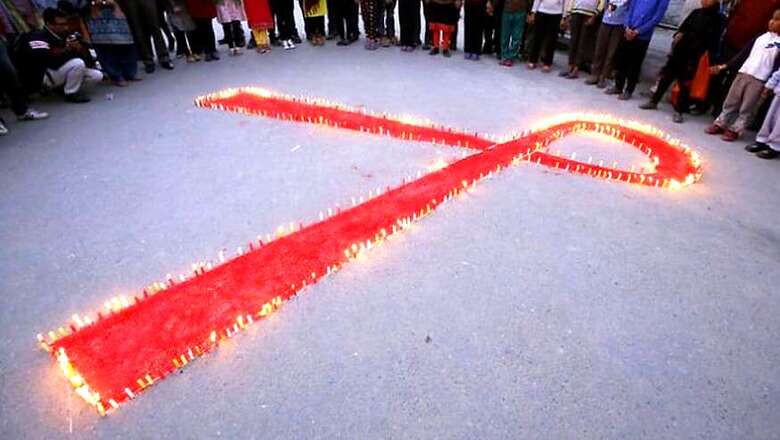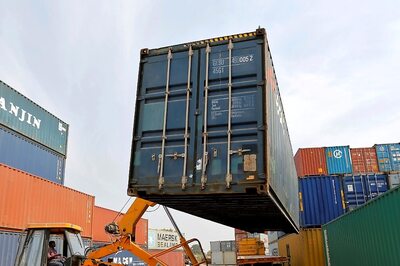
views
This World AIDS Day brings a mixed bag for India’s HIV Positive community as there’s cheer that the country has managed to put a million infected on anti-retroviral treatment (ART) but worries mount over an important legislation that borders on the ambiguous with regard to the government’s commitment to tackle the deadly disease.
India has the third largest number of HIV cases worldwide, with an estimated 21 lakh people living with HIV. Of these, around 15 lakh have been diagnosed and 10 lakh are on ART. According to a Lancet study, 1.96 lakh new cases emerged in 2015, and the number of people who died of AIDS-related complications is 1.3 lakh.
Civil society organisations complain that the government – especially the finance ministry – has failed to comprehend that in HIV/AIDS the treatment is prevention. They fear that stock outs of vital medicines and testing kits will force vulnerable people off their regimen, dissuade them from regular trips to far off hospitals and allow the virus to proliferate, possibly leading India back to the dark days when the epidemic struck first.
However, a larger cause of concern is the HIV/AIDS (Prevention and Control) Bill 2014, slated to be taken up by the Rajya Sabha in the current session.
Activists say that a line – “As far as possible” – inserted in Section 13 of the bill casts a shadow over the government's responsibility to provide “diagnostic facilities relating to HIV or AIDS, anti-retroviral and opportunistic infections management to people living with HIV (PLHIV) or AIDS”.
Lawyers who helped draft the bill and public health workers fear this ambiguity will provide the government with an escape route whenever they have to be held accountable for the lack of necessary health care.
The Lawyers Collective was tasked with drafting the bill in 2002 and, since then, it has gone through “rigorous scrutiny”, say health professionals, with consultations from the PLHIV communities, grassroot health workers and organisations, state AIDS control boards, and also the government of India.
Already the country’s anti-HIV supply chain has been affected by funds not reaching state aids control societies on time. The situation in the national capital itself is alarming giving a glimpse to what could be happening in rural areas.
As the Delhi Network of Positive People (DNP+) listed out in an email to the National AIDS Control Organisation on November 17, hospitals across Delhi have run out of HIV testing kit 3, the highly accurate test used to diagnose infection in patients who have no symptoms but could be at risk. The email, according to the network came after a meeting with National Aids Control Programme’s (NACO) Director (Finance) Ajay Singh Chauhan on November 10, where he was apprised of the situation.
In Chhattisgarh, 24 children with HIV have died because of lack of medicines this year, said activists from the state.
The anti-retroviral treatment (ART) centres and the integrated counselling and testing centres (ICTC) are the backbone of India’s AIDS control programme and a lifeline for the many who live with either HIV or AIDS related complications.
Yet, these centres have found themselves in regular short supply of drugs and testing kits, as seen by DNP+ and other civil society bodies working with affected or at risk people. Media reports from the past two years have also question whether India’s internationally hailed AIDS programme is falling apart at the grassroot level, with stock outs recurring frequently from 2014.
The communities fear only an escalation of this, and shirking of responsibility from the government’s side.
More worryingly, an interruption of a few days from the strict 12 hourly drug schedule leads to drug resistance. It renders the first line treatment ineffective and pushes the patient to the 2nd line, for which medicines are harder to procure.
At the an award ceremony for HIV community leaders by HIV India Alliance, Wednesday night, one grassroot leader Daxa Patel, directly addressed Dr. CV Dharma Rao, joint Secretary NACO, to ask the government to remove this phrase from the Bill.
“The head of the NACO said there could be financial difficulties with the Bill,” said Paul Lhungdim, from the DNP+, recounting his conversation with NC Kang, Director General of NACO. “He gave us an example, that if someday there is a drug that costs Rs 300,000, how will the government buy that for all patients?” According to Llungdim, NACO feared that the Ministry of Finance would not agree to the Bill without its current phrasing.
Leena Menghaney, lawyer and health activist, said the government never had to worry about procuring expensive drugs, as the country’s health activists and civil society steadily fought against patents on crucial medicines, allowing the generic pharmaceutical industry to create cheaper versions of drugs. She argued that the government, instead of pre-emptively fearing an expensive medicine, should encourage competition in India’s highly capable generic industry, so as to keep the prices down.
“But a generic company may not want to produce a drug which has a small market, say the 15-20,000 people on 2nd line treatment or the 200 people on third line,” said Dr. R Gangakhedkar, Director In Charge of the National Aids Research Institute, Pune, offering a counter argument. He cautioned against alarm, saying that the government was aware of its responsibility and “as far as possible” did not dilute the right to life, as the community feared.
However, he too agreed that inefficient management of the supply chain and unprofessional handling of transport had created many blockages in getting drugs and kits to the people in dire need.
DNP+ records of their daily monitoring of Delhi’s ART centres show shows the urgency of the situation, as the team’s report from November 17 shows that the ICTCS in Ambedkar hospital, Safdarjung hospital, the All India Institute of Medical Sciences, and the National Institute of Tuberculosis & Respiratory Diseases do not have kit 3 and the staff does not know when they will be restocked. The email also lists eight different times DNP+ has tried reaching different authorities in 2016 itself, over the kit 3 stockout.




















Comments
0 comment